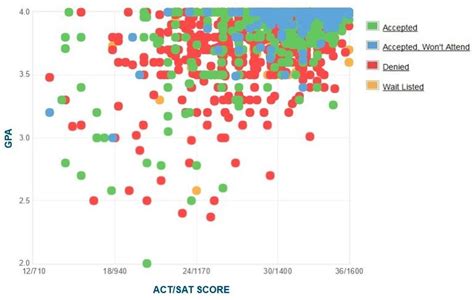Duke University, renowned for its academic rigor and prestigious reputation, requires prospective students to demonstrate their academic prowess through standardized testing. The ACT (American College Test) is one of the primary metrics used by Duke to assess the academic abilities of applicants. In this comprehensive guide, we will delve into the Duke average ACT scores, provide strategies to improve your score, and offer tips and tricks to maximize your success.

Understanding Duke’s ACT Standards
To understand Duke’s expectations regarding ACT scores, it is crucial to analyze the data released by the university. According to the most recent Common Data Set (CDS) published by Duke, the following are the ACT score ranges for enrolled freshmen:
| Percentile | 25th Percentile | 50th Percentile | 75th Percentile |
|---|---|---|---|
| ACT Composite | 34 | 35 | 36 |
These figures indicate that most Duke freshmen score within the range of 34 to 36 on the ACT composite. It is important to note that these scores are not absolute minimums or maximums; they represent a range.
Aiming for a Competitive Score
While the Duke average ACT score provides a general understanding of the university’s expectations, it is beneficial to strive for a competitive score to increase your chances of admission. Based on the CDS data, aiming for an ACT composite score of 35 or above is recommended. Here are some strategies to help you achieve this goal:
Effective Strategies
- Practice Regularly: Consistency is key when preparing for the ACT. Dedicate regular time each week to practice answering questions and reviewing material.
- Identify Weaknesses: Take diagnostic tests to pinpoint areas where you need improvement. Focus on strengthening these areas through targeted practice.
- Use Official Resources: Utilize resources provided by the ACT, such as practice tests and study guides, to familiarize yourself with the exam format and content.
- Attend Prep Classes: Consider enrolling in ACT prep classes offered by reputable organizations or tutors to enhance your preparation.
- Manage Time Wisely: Learn effective time-management techniques to avoid rushing through questions and maximize your accuracy.
Tips and Tricks
- Guess Strategically: When uncertain about an answer, eliminate options that are clearly incorrect and guess intelligently to increase your chances of getting the question right.
- Pace Yourself: Divide the allotted time for each section wisely to ensure that you have sufficient time to complete all questions.
- Review Carefully: Double-check your answers before submitting the test to minimize errors.
- Utilize Scratch Paper: Use scratch paper to solve math problems and take notes during the reading and science sections.
Common Mistakes to Avoid
- Overconfidence: Do not underestimate the difficulty of the ACT and engage in thorough preparation.
- Lack of Practice: Insufficient practice can lead to poor performance on test day.
- Ignoring Time Management: Rushing through the exam can compromise your accuracy and overall score.
- Neglecting Diagnostic Tests: Identifying areas of weakness is crucial for targeted improvement.
- Ignoring Official Resources: Relying solely on unofficial resources may provide incomplete or inaccurate information.
Additional Tips to Enhance Your ACT Score
- Set Realistic Goals: Aim for a score that aligns with your academic abilities and trajectory.
- Seek External Help: Connect with teachers, counselors, or tutors for guidance and support.
- Utilize Test-Taking Strategies: Explore different strategies, such as the “pencil trick” or “backward sequencing,” to improve question-solving efficiency.
- Maintain a Positive Attitude: A confident and positive mindset can enhance your performance on test day.
Table 1: Duke ACT Score Comparison with Peer Institutions
| University | ACT Composite Range |
|---|---|
| Duke University | 34-36 |
| Stanford University | 33-36 |
| University of Pennsylvania | 34-36 |
| Massachusetts Institute of Technology | 34-36 |
| Harvard University | 34-36 |
Table 2: ACT Subject Test Scores for Duke Applicants
| Subject | 25th Percentile | 50th Percentile | 75th Percentile |
|---|---|---|---|
| English | 35 | 36 | 37 |
| Math | 34 | 35 | 36 |
| Reading | 35 | 36 | 37 |
| Science | 34 | 35 | 36 |
Table 3: ACT Composite Score Distribution for Duke Enrolled Freshmen
| ACT Score Range | Percentage of Students |
|---|---|
| 34-36 | 75% |
| 32-33 | 20% |
| 30-31 | 5% |
Table 4: ACT Score Trends for Duke Applicants
| Year | ACT Composite Score Range |
|---|---|
| 2017 | 34-36 |
| 2018 | 34-36 |
| 2019 | 34-36 |
| 2020 | 34-36 |
| 2021 | 34-36 |
Conclusion
The Duke average ACT score serves as a benchmark for prospective students to gauge their competitiveness for admission. By aiming for a competitive score, understanding Duke’s expectations, and implementing effective strategies, you can maximize your chances of impressing the admissions committee. Remember that consistent practice, targeted improvement, and a positive attitude are essential for achieving your ACT goals.
